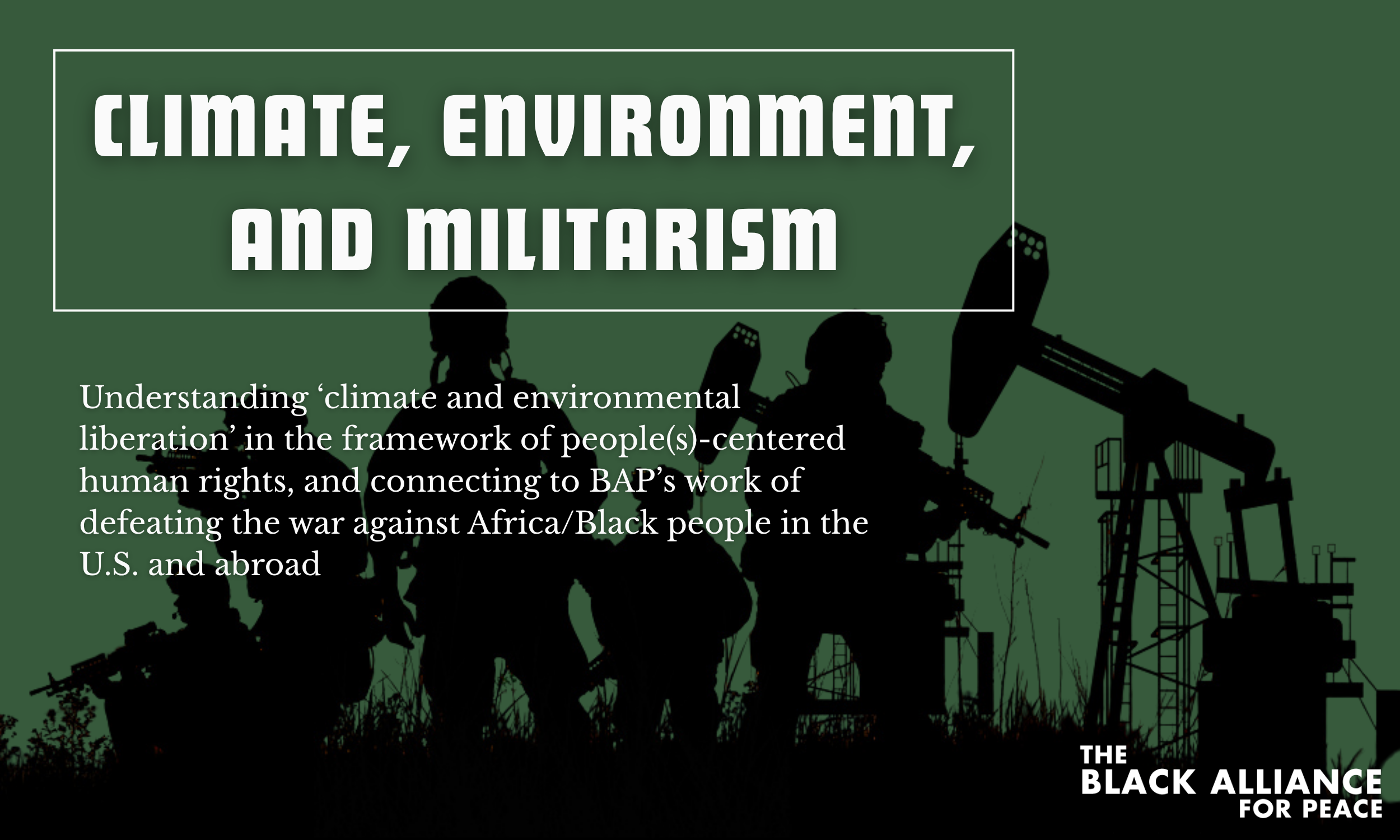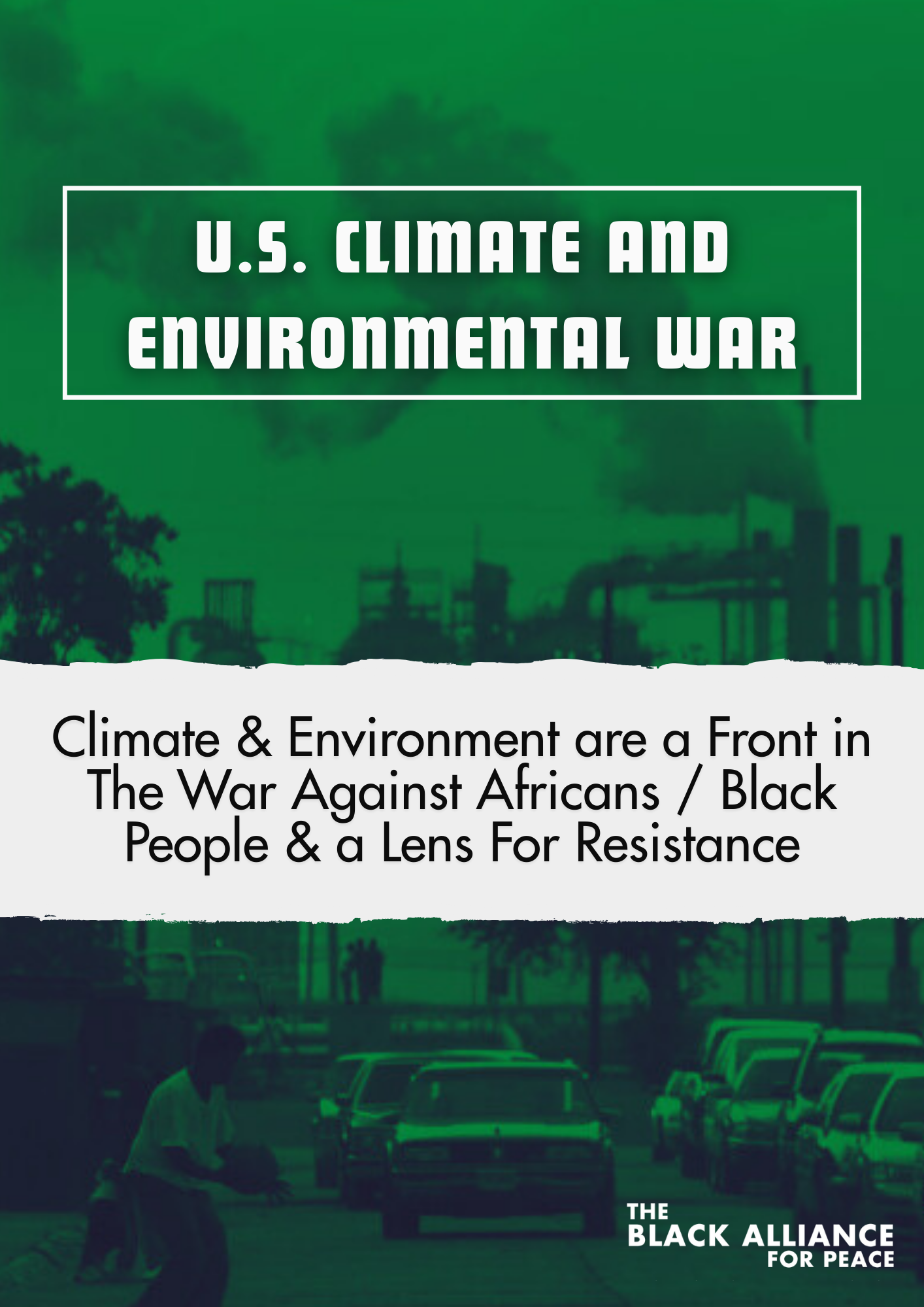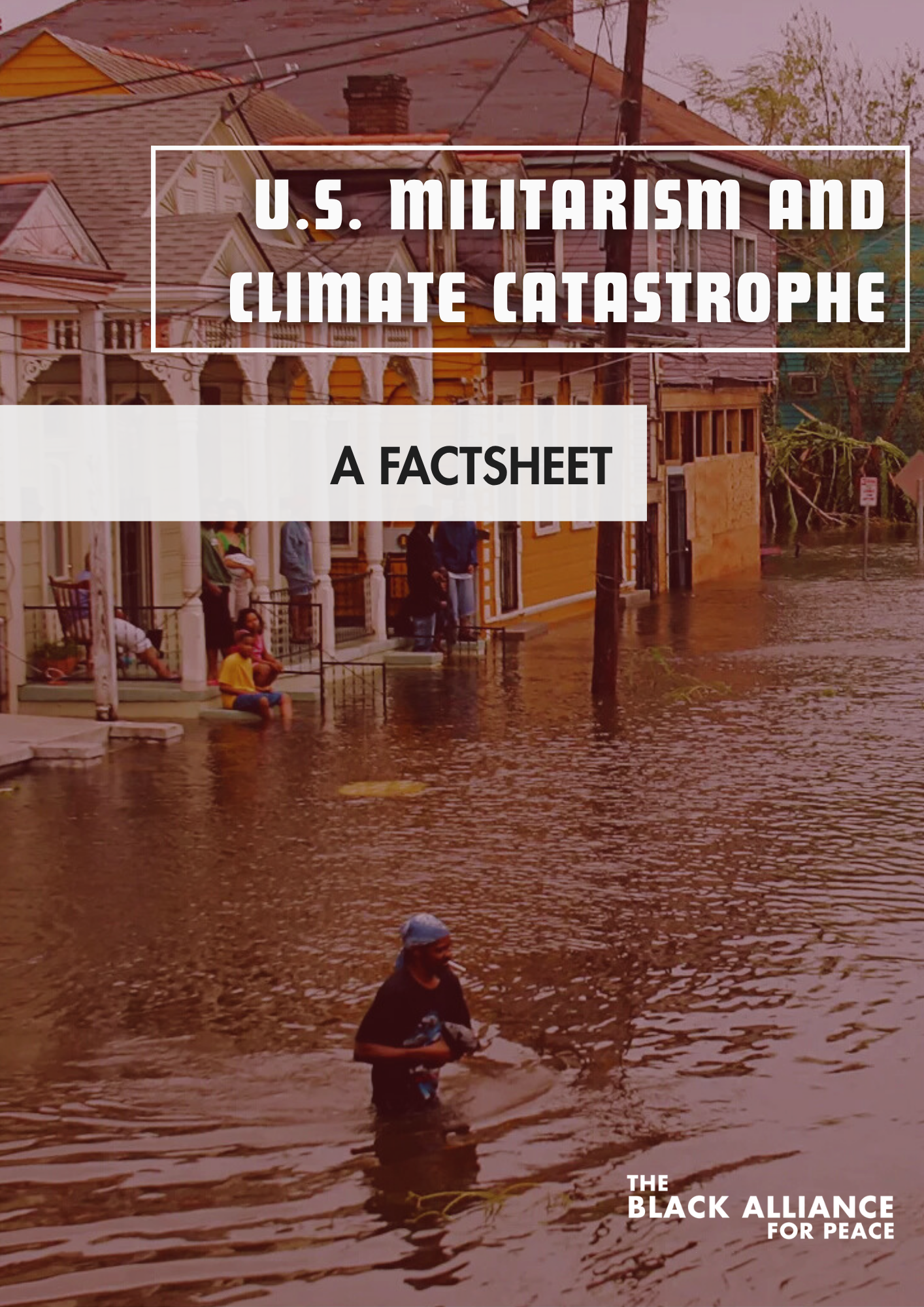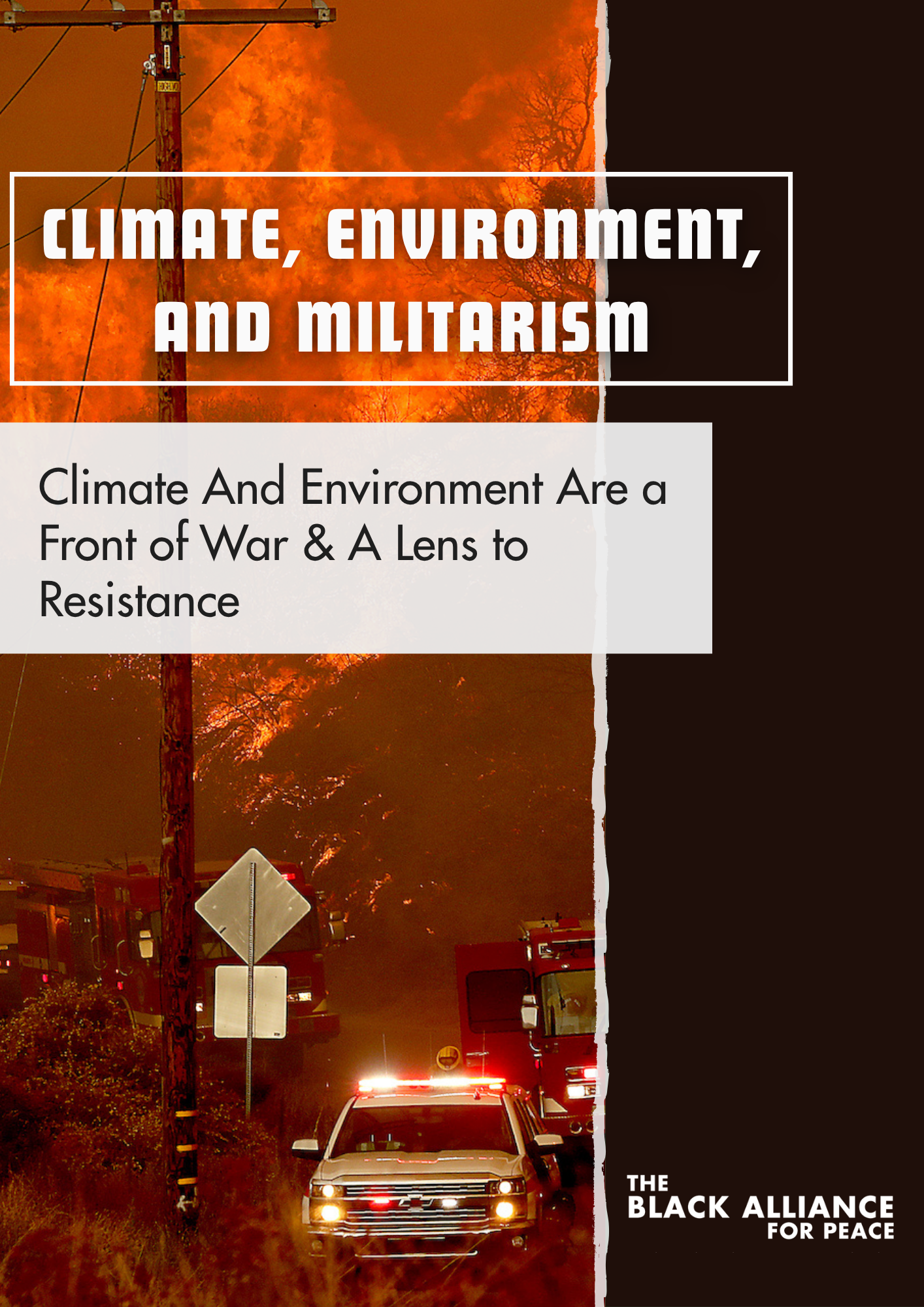Climate, Environment, and Militarism
Understanding ‘climate and environmental liberation’ in the framework of people(s)-centered human rights, and connecting to BAP’s work of defeating the war against African/Black people in the U.S. and abroad.
The accelerating climate crisis disproportionately impacts Black/African, Indigenous, colonized, poor, and working-class peoples and communities worldwide. Rooted in white supremacy, patriarchy, and colonization, the harmful foundations of capitalism are most visible through toxic industries, militarism, energy systems, and agriculture that poison land, air, and water.
Black/African/Afro-descendant communities are locked into systems that shorten life expectancy both acutely and chronically. In the U.S., Black/African communities are concentrated in climate-vulnerable regions like the Gulf South, Altadena (CA), and the Great Lakes “Heartland.” These areas face compounded risks from weakened environmental protections, FEMA’s white supremacist policies, rising insurance discrimination, rollbacks of SNAP/Medicaid/LIHEAP, and austerity-driven privatization of public goods.
Globally, African/Afro-descendant communities across the so-called Global South and Intentionally Underdeveloped Nations (IUNs) experience similar vulnerabilities.
Instead of working to resolve these injustices, the state’s response is militarized control to expand domination: AFRICOM; SOUTHCOM; NATO expansion; the genocide in, and occupation of, Palestine; as well as the rise of domestic militarism (from “Cop Cities” to AI/Cloud Computing-driven data centers). These dynamics pair the deepening of ecological destruction with repression of popular dissent. The crises stemming from a long-standing strategy of global imperialist domination led by the U.S. and ‘western’ allies has only increased its reliance on both violent militarism and the hyperexploitation of our Earth – accelerating the urgency for a strategic fight-back through coordinated popular power of impacted/frontline communities, people-centered movements, and anti-imperialist nations. Only by linking these struggles can we move toward realizing collective self-determination, human dignity, and right relationship with the Earth and its systems.
How we hope to collaborate:
Expand the conversation to bring a sharper lens on militarism, imperialism, and climate and environmental warfare.
Share analysis and highlight how climate struggle intersects with U.S. militarism, AFRICOM/SOUTHCOM, policing, economic warfare, and surveillance.
Provide support and framing that helps advance our collective organizing, educational development, and movement sustainability.
Open space for strategic development: to invite dialogue with organizations ready to explore resistance and liberation frameworks, particularly across five key sectors:
Land
Water
Air
Energy (Democracy)
Militarism (International & Domestic)
Broader Connections
This initiative is connected to both BAP’s core campaign “No Compromise No Retreat: Defeat the War Against African/Black People in the U.S. and Abroad” & the North/South Project for People(s)-Centered Human Rights.
‘No Compromise No Retreat’ objectives related to this campaign
OBJECTIVE: Assert the sovereignty, dignity, and right to self-determination of African/Black peoples and all peoples and nations globally by ending violations of our people(s)-centered human rights.
DEMAND: Expose and confront the climate and environmental war on our peoples and lands, by prioritizing the dismantling of its root causes in the structures of capitalism, colonialism, patriarchy, U.S.-led militarism and imperialist conflict.
DEMAND: End economic warfare on our people and neighborhoods: Defend African/Black, working class and poor people, and our neighborhoods by confronting the economic attacks, including neoliberal austerity policies; privatization and expropriation of land and human needs; and capitalist exploitation of our labor, resources, and people.
CLIMATE, ENVIRONMENT, AND MILITARISM
CAMPAIGN OBJECTIVE:
Support policy imperatives that reduce militarize power and advance people(s)-centered human rights.
While ‘justice’-focused policy advocacy, particularly at a local level is key to protecting PCHRs, Climate and environmental liberation requires moving beyond justice. because in a world that has become so imbalanced and unequal, exacerbated by a white supremacist, capitalist-fueled climate crisis, achieving ‘justice’ or ‘ecological balance’ is impossible with liberation, which requires defeating the interlocking systems of oppression that cause this imbalance and inequality: capitalism, white supremacy, colonialism, patriarchy, militarism, and all forms of imperialism.
Our 5 priority pillars in the struggle toward climate and environmental liberation
LAND is foundational to our survival, autonomy, and cultural continuance. Colonial capitalist land-based violence takes place across locations and scales. Liberation means securing land not just for survival but for collective self-determination and community self-reliance.
WATER is life, but under colonial capitalism, it is treated as a tool of control and a commodity to be exploited for profit. A liberatory vision for water liberation means community-controlled water systems, full funding for safe infrastructure, and solidarity with nations resisting water colonialism.
AIR is essential to individual and community health. Fighting for clean air is a struggle against the pollution and environmental degradation caused by capitalist production. This fight interconnects community health, individual quality of life, childhood development, capitalist production, global power structures, and more.
ENERGY is a vital tool of survival, exploitation, and geopolitical power; the global energy economy is built on the back of colonized peoples’ land and labor. Liberatory energy demands popular and national energy sovereignty, public ownership of utilities, a just transition for workers, and systems that heal rather than harm.
MILITARISM is a tool of imperialism and driver of ecological collapse, and the U.S. military is the largest emitter of greenhouse gases on Earth, yet is exempt from most international climate accountability. Militarism enforces climate apartheid, supports border regimes that criminalize refugees, and violently maintains fossil fuel dependency. The spread of AFRICOM, NATO operations, and occupation zones shows that the struggle against militarism is inseparable from climate injustice.





